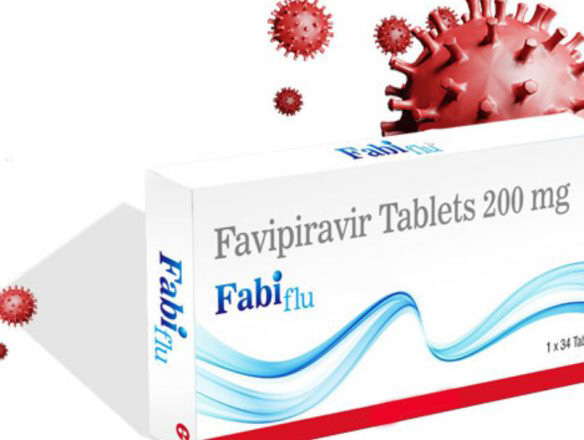Favipiravir: Studies Involving Animal Models Shows Favipiravir Has Very Weak Effect On SARS-CoV-2 And Not Viable As An Effective Therapeutic
Source: Favipiravir And COVID-19 Jun 23, 2020 5 years, 7 months, 1 week, 9 hours, 11 minutes ago
Favipiravir: The COVID-19 pandemic has made the medical and pharmaceutical world one big circus with many charlatans including Government authorities for the sake of greed, power or ego endorsing drugs that do not have any proven efficacy to treat the COVID-19 disease let alone safety studies done on their usage. One example is hydroxychloroquine and we are not going to elaborate on it here as everybody by now knows the saga. Unfortunately the losers at end of this whole debacle are the general public who are sometimes administered with ineffective or worse lethal drug when they are infected with the COVID-19 disease and the doctors who have to listen to corrupted or incompetent health and government officials dictating the drugs to use.

There has been many such drugs not only hydroxychloroquine and if one was to actually see and track back many of these misinformed reports and ‘studies’, mostly originated from China during the early days when the Wuhan virus first made its debut and caused the local epidemic in China. The Chinese initially said drugs like Lopinavir/ritonavir, and alpha-interferon worked etc along with a list of many other drugs. But truth of the matter is that the drugs or protocols that actually worked have been concealed by the Chinese Government and even all published studies on those protocols involving certain repurposed drugs and also TCM herbs have all been deleted from online sites and classified.
Interestingly one drug that the Chinese kept on pushing to foreign countries but strangely enough was not used in their own local protocols is favipiravir which China has a vested interest as it owns the license and patent rights to the drug and also supplies the raw materials to the Japanese company that originally created the drug.
Now another study from Belgian researchers shows that teratogenic drug Favipiravir could have only a very weak effect against the dreaded novel coronavirus or severe acute respiratory syndrome coronavirus 2 (SARS-CoV-2) as seen in hamster models.
The study is published in a preprint study and is yet to be peer reviewed.
https://www.biorxiv.org/content/10.1101/2020.06.19.159053v1
This study focused on two drugs ie hydroxychloroquine and favipiravir. The study completely discounted hydroxycholoroquine as it showed no efficacy at all.
For the study, the team used a small animal model in Syrian hamsters. They evaluated the antiviral activity of small molecules on the infection as well as the transmission of the infection. In the animals, the virus was introduced intranasally or via the nose. The virus sample used to infect the hamsters was the SARS CoV-2 strain called the “BetaCov/Belgium/GHB-03021/2020 (EPI ISL 407976|2020-02-03)”, which was collected from the nasopharyngeal swab from an asymptomatic patient who had returned from Wuhan, China at the start of February 2020. The sample was obtained from an RT-qPCR sample.
Thereafter the levels of the virus were found to be raised to high titers in the lungs of the animals. They also developed pathology, which was similar to humans when they developed mild COVID-19 infection. The drugs favipiravir or hydroxychloroquine (with and without azithromycin) were administered to the infected hamsters and the effects of the drugs were noted.
The research animals underwent a micro-CT scan to analyze the effects of t
he virus on their lungs and the effects of the drugs on the infection progression. The lung tissues of the treated and non-treated hamsters were also collected, and histopathology was performed. Results showed that there were no additional benefits or improvements seen with therapy compared to untreated hamsters.
The researchers wrote, “In addition, both compounds did not prevent virus transmission through direct contact and thus failed as prophylactic treatments.”
The researchers concluded, “we here characterized a hamster infection and transmission model to be a robust model for studying in vivo efficacy of antiviral compounds.” This study can be critical in future drug development because it could help pre-clinical studies of new drugs against the SARS CoV-2 virus.”
The efficacy role of favipiravir is also not very pronounced, they said in the study findings.
The researchers said, “The very modest reduction of viral load in the lungs of hamsters treated with favipiravir and the lack of efficacy in the transmission model, also suggests that the potential benefit of this drug in humans may be very limited as well.”
However what confused us at Thailand Medical News was that there was so much media coverage in both medical and mainstream that covered this study and worst it came to our attention that certain third world countries were still using favipiravir in their treatment protocols when already studies by the US FDA and WHO had shown that it was not effective.
https://www.thailandmedical.news/news/breaking-covid-19-drugs-us-fda-drug-trial-concludes-that-most-drugs-being-used-including-favipiravir,-lopinavir,-ritonavir,-chloroquine-has-no-effects
Countries like Canada also omitted the use of favipiravir from its prescribed protocols to treat COVID-19.
https://www.thailandmedical.news/news/covid-19-guidelines-canadian-medical-association-issues-new-treatment-protocols-that-omit-use-of-favipiravir,-lopinavir-ritonavir,-hydroxychloroquine-
The drug itself is controversial as it’s a teratogenic plus proper safety studies were never conducted and the Japanese company that initially created it as a broad spectrum antiviral against the flu virus themselves never used it and withdrew it from shelves for many years.
https://www.thailandmedical.news/news/does-the-teratogenic-drug-avigan-favipiravir-really-work-on-covid-19-or-is-it-just-a-placebo-that-china-wants-to-use-as-a-bargaining-chip
However it shocking to see certain third world countries still using the drug perhaps due to China’s influence or due to certain deals involving corruption.
Thailand Medical News will continue to cover research developments about
Favipiravir and also the latest COVID-19 Drug Research.
HELP! Please help support this website by kindly making a donation to sustain this website and also all in all our initiatives to propel further research: https://www.thailandmedical.news/p/sponsorship
